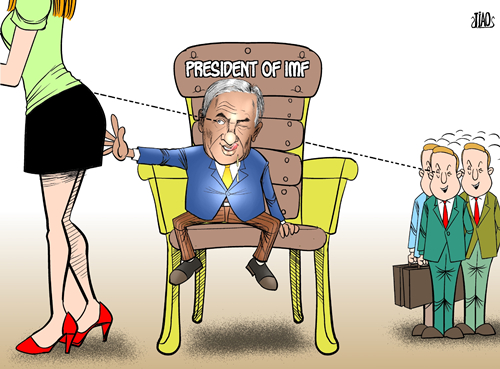The Strauss-Kahn scandal and the U.S. plot
- By Shen Xiaoquan
 0 Comment(s)
0 Comment(s) Print
Print E-mail
China.org.cn, July 7, 2011
E-mail
China.org.cn, July 7, 2011
|
|
|
?Seat available? [By Jiao Haiyang/China.org.cn] |
The release of ex-IMF chief Dominique Strauss-Kahn from house arrest, on his own recognizance, last Friday has stirred up speculation of a conspiracy theory. Strauss-Kahn is a forerunner in the 2012 French presidential campaign, a popular Socialist candidate who threatens the rein of President Nicholas Sarkozy. And as head of the IMF, he challenged U.S. dominance with proposals to replace the dollar as the international reserve currency and give other countries more power in the IMF.
His positions, which were at odds with financial decision makers in Washington, give the U.S. reasons to smear his reputation. Strauss-Kahn wanted to reform the IMF so that it acted more as a global central bank than merely operating from crisis to crisis. The U.S. firmly opposed his idea because many of its Treasury bonds would be deserted and it would no longer be able to pay its debts. The U.S. is also the only country with veto power in the IMF, but Strauss-Kahn wanted to give more voice to emerging economies in the fund's administration.
Strauss-Kahn also thought the Washington Consensus of free trade and deregulation had failed following the global financial crisis and wanted to design a new macroeconomic framework in which, he said, "the pendulum would swing – at least a little – from the market to the state." The U.S. finds this change a threat to its interest in keeping economic hegemony. To financial decision makers in Washington, the IMF is but an affiliate to the U.S. government to execute the Washington Consensus, not a global governing organization.
A U.S. conspiracy to oust Strauss-Kahn may be further supported by the timing of his arrest and release. Strauss-Kahn was taken into custody on May 14, just days before important meetings with other leaders to address the European debt problems. He had played a pivotal role in securing emergency bailouts in Greece, Portugal and Ireland – which the U.S. opposed – so his absence would likely have affected further actions to stabilize the EU. Then, he was released just three days after the IMF chose his successor, French Finance Minister Christine Lagarde. With the new appointment, Strauss-Kahn lost any chance to return to the IMF.
No one can say for certain that the U.S. produced the scandal. But Wall Street and Washington are glad to see Strauss-Kahn gone.
Shen Xiaoquan is a researcher and senior editor at the International Affairs Research Center of Xinhua News Agency.
(This article was written in Chinese and translated by Li Shen.)
Opinion articles reflect the views of their authors, not necessarily those of China.org.cn
Go to Forum >>0 Comment(s)
 Add your comments...
Add your comments...
- User Name Required
- Your Comment
- Racist, abusive and off-topic comments may be removed by the moderator.






